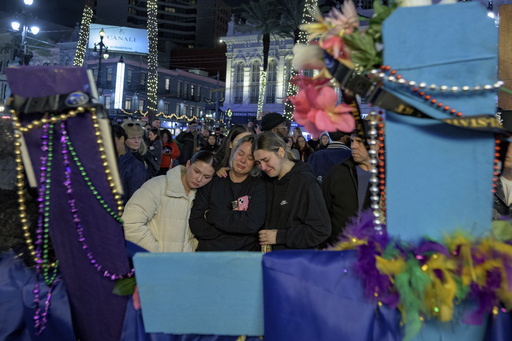
NEW ORLEANS — Following a tragic incident on New Year’s Day that claimed the lives of 14 people and injured many others in the French Quarter, New Orleans officials have expressed confidence in the security measures being implemented for the upcoming Super Bowl. This major sporting event is set to begin on February 5, drawing an estimated 125,000 visitors for various events including parties, concerts featuring artists like Post Malone and Diplo, and culminating in the NFL championship game on February 9 between the Kansas City Chiefs and the Philadelphia Eagles at the Caesars Superdome.
In response to the catastrophic truck attack on January 1, which occurred along Bourbon Street, there has been significant scrutiny of the city’s security protocols. Allegations of lapses led to multiple lawsuits and investigations. However, city officials, the NFL, and law enforcement assert that they have undertaken extensive preparations over the past year to ensure a safe event. “We’re going above and beyond what we’ve seen in the past when we’ve hosted previously,” stated Mayor LaToya Cantrell, emphasizing an unprecedented level of safety.
The security presence during the Super Bowl will comprise thousands of officers from local, state, and federal agencies, according to Cathy Lanier, the NFL’s Chief Security Officer. Although specific operational details remained undisclosed, certain measures have been confirmed. Drones will be prohibited from the vicinity of the Superdome and surrounding areas throughout the game’s week, alongside flight restrictions extending up to 18,000 feet as per FAA guidelines.
Moreover, armed federal air marshals will be positioned at various transportation hubs in New Orleans, keeping a lookout for any alarmingly suspicious activities and monitoring for unauthorized drone flights, according to Noel Curtin from the Transportation Security Administration. Notably, the security for events will expand beyond the stadium area, with the Department of Homeland Security’s Eric DeLaune overseeing the coordination. High-profile safety reinforcements, including snipers and armored vehicles, are planned across both the stadium and iconic locations such as the French Quarter.
Attendees without credentials will be barred from the secured perimeters surrounding the Superdome, and traffic restrictions have already been initiated on adjacent roadways. These areas will feature blast barriers, and trucks will be required to pass through advanced X-ray systems typically used at border checkpoints. Technicians and over 100 bomb-sniffing dogs are conducting thorough inspections of the Superdome and its numerous seating areas leading up to the event.
Much of the enhanced security implemented for the Super Bowl is expected to carry over into the Mardi Gras festivities, which have been elevated to the highest risk rating from Homeland Security for better resource allocation. As outlined by Phillip Constantin from the U.S. Cybersecurity and Infrastructure Security Agency, the significant presence of law enforcement and security measures makes New Orleans a highly secure location during the Super Bowl.
The January 1 incident has prompted major adjustments to security protocols. Legal actions have alleged that city officials knew of vulnerabilities along Bourbon Street where the attack occurred. The city is advancing its plans for a bollard system intended to block vehicular traffic, projected for completion prior to the Super Bowl. Authorities are also implementing additional physical barriers, prompted by concerns regarding the effectiveness of the planned system against potential vehicular attacks.
In light of recent developments, the NFL and local agencies have reassessed their security plans. Past police experiences were leveraged by bringing in former New York City Police Commissioner William Bratton for additional oversight. Notably, security chief Lanier mentioned that there are “no specific or credible threats” targeting the Super Bowl. Furthermore, Louisiana Governor Jeff Landry announced the formation of an “enhanced security zone” along Bourbon Street coinciding with the Super Bowl weekend, including the deployment of 350 National Guardsmen.
Following investigations that uncovered potential threats, including explosive devices near the French Quarter, a ban on coolers and ice chests has been imposed in these areas. Searches will be mandatory for anyone entering the Bourbon Street zone during the event. However, under state law, firearms—including permitless concealed carry weapons—will be permitted on Bourbon Street, although they remain prohibited in bars. Measures have also been taken to address local homeless encampments near the stadium.
In an effort to bolster security, the Superdome’s management has hired an artificial intelligence firm to monitor potential threats in real time. Utilizing over one million sources of data, Dataminr will provide alerts related to emerging patterns or incidents throughout the event. This technology serves to enhance awareness and improve the response strategy to any developing situations.
Visitors will also have access to the NOLA Ready Public Safety App, enabling them to report suspicious activities and receive timely security updates, ensuring that safety remains a priority throughout the Super Bowl festivities.

